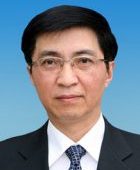Wang Huning 王沪宁
Head Central Committee Secretariat
1955
5th ranked Politburo Standing Committee member with links to the TAR. In charge of Propaganda.

Overview
Pronunciation: Wang Hoo-ning
Born: 1955 in Shanghai
Education: Studied French, subsequently becoming the youngest Associate Professor at Fudan University in Shanghai.
Career: A political ideologist credited with advising three Presidents. Has worked at the Central Policy Research Office since 1995 and Director since 2002.
Prospects: Close advisor of Xi Jinping, accompanying him on many foreign visits. In charge of ideology, propaganda and party organization.
Relevance to Tibet: One of China’s most senior leaders with an involvement in Tibet. Thought to have liberal tendencies. Likely to have considerable influence.
Standing in the Party and Career Highlights:
Wang Huning is an influential political theorist who is credited not only with being one of the architects of Xi Jinping’s “Chinese dream” concept, but also Jiang Zemin’s “Three Represents” and Hu Jintao’s “scientific theory of development”.
After an academic career, Wang Huning joined the Central Policy Research Office, or party think tank, combining – according to the South China Morning Post – “the roles of national policy adviser, chief speech-writer and principal theorist to the country’s top leader.” He became the Office’s Director in 2002.
In 2007, Wang was appointed to the Central Committee Secretariat and in 2012 gained a seat on the Politburo. He was a member of the 16th, 17th and 18th Central Committee. In 2012 he became a member of the Politburo.
Two articles written in the 1980s apparently demonstrate his liberal tendencies: In 1986, his article “Analysis on the Ways of Political Leadership During the Modernisation Process”, advocated that a centralised government could maintain stability and drive growth, while gradually expanding its democratic principles from within. “At the time being, centralised decision-making power and modernisation is more ‘politically efficient’,” he wrote. “This model has achieved stunning economic results, but it has also been criticised … because of the low level of democracy involved.” He ended the seven-page article by saying that a society experiencing rapid economic growth and modernisation would face growing conflicts and greater demands for democracy. “When the society reaches this stage, political reform would be inevitable,” he wrote. [South China Morning Post.]
Also first published in 1986 (with a fifth edition released in 2012), “Reflections on the Cultural Revolution and the Reform of China’s Political System” included his views on the Chinese constitution: “It is very important to comply with the constitution,” he wrote. “If citizens can be taken away without following the law and constitution, and actions that infringe people’s personal freedom, or even using violent threats and storming academic activities can be immune from responsibility, the Cultural Revolution could happen again.”
Wang Huning has a connection with Tibet: seasoned China watcher Jayadeva Ranade has written that Wang Huning has in the past been a member of Tibet Autonomous Region delegations to the National People’s Congress.
Wang Huning has travelled extensively with Xi Jinping, for example during the BRICS summit in Xiamen, the G20 meeting in Hamburg and in Hong Kong for the 20th anniversary of its return to China.
In his first appearance “centre stage” in the Chinese media as Propaganda Chief, Wang urged all Chinese journalists to follow the lead of the Chinese Communist Party (CCP) “unswervingly.” [The Diplomat, 8 November 2017]
Wang was named chairman of Central Guidance Commission on Building Spiritual Civilization in November 2017. Established in 1997, the Commission is tasked with educational efforts to build a “spiritual civilization” based on socialism and the goal to build a socialist harmonious society. According to Wikipedia the Commission controls nationwide propaganda and ideological dissemination, overlapping the Leading Group for Propaganda and Ideological Work, which Wang Huning also Chairs.
Wang Huning’s Contact Information:
- Address: Zhongnanhai, Xi Chang’an Jie, Beijing 100017.
- Website: www.gov.cn
- Phone: + 86 10 6307 0913
- Fax: + 86 10 6307 0900
